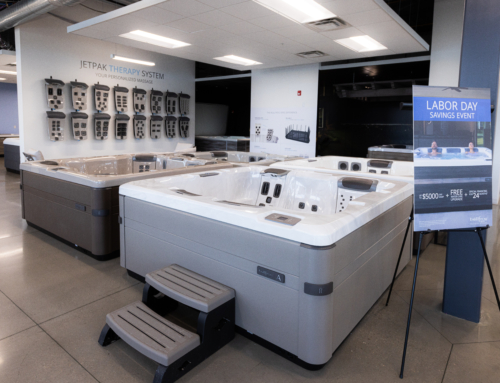A first-time customer is quietly eyeing the top spa models on your showroom floor. One of your salespersons asks if he needs any assistance. “No, I’m just looking, thank you,” the customer replies. The salesperson backs down, and a few minutes later the prospective buyer leaves without making a purchase. In this situation, had the salesperson anticipated this reaction, he or she could have pursued a different approach or started the interaction sooner. Enter role play sales training.
When a customer enters the showroom, your sales team needs to be prepared for any number of interactions. No two customers are alike and every scenario varies slightly. However, in identifying and recreating specific sales interactions, good and bad, you can create in-depth role playing scenarios to train your staff and improve your sales.
Why Role Play?
Role playing is an effective hands-on training method for both new hires and veteran sales staff alike. The benefit is two-fold: it reinforces good sales practices, such as product pitching, and helps your sales staff anticipate different situations, purchasing behavior, and customer personalities.
Ultimately, a team that is ready for any situation is poised to close more sales.
When asked why he uses role playing with his sales team, Davin Christensen of Bullfrog Spas Factory Store in Orem, UT replies, “You do not truly understand something until you can simplify it and teach it to somebody else in a way that is crystal clear and easy to understand. Role playing is an excellent method to solidify your own product knowledge and belief in the effectiveness of what you are selling.”
In other words, role playing invites your sales team to examine how the products, the business, and the customers come together. Regular reinforcement of product benefits and selling points builds a knowledgeable salesforce. Through hands-on training, your sales staff can better prepare for unexpected interactions and even unpleasant encounters. Ultimately, a team that is ready for any situation is poised to close more sales.
Role Playing Strategies
The goal of role playing scenarios is to get your sales team members to experience the interaction from the customer’s perspective in order to evaluate and adapt their approach. Most importantly, role play training is not a one-time crash course; it’s an ongoing, recurring practice.
As Terry Guilfoyle, Director of Sales for Bullfrog Spas, puts it: “It’s not just about doing the role play a few times a year in seasonal sales trainings. It’s about managers instilling the habit of practice every week, even every day before and after actual customer interactions, based on those interactions.”
Here are a few basic strategies you can use to implement more effective role playing in your training program:
1. Use a Script
While you want to allow your role play scenarios to feel realistic and natural, you should nevertheless prepare a script as a starting point. Scripts are especially helpful for new members who have less experience in the field. They’re given a fair chance to learn effective sales strategies and evaluate their performance. Most importantly, scripts keep your training sessions focused.
2. Focus on Specific Subjects and Goals
Effective role playing uses real-life situations as teaching opportunities. With every session, you should focus on one or two specific situations at a time, with clear goals in mind. For instance, you could base an entire session on how to interact with showroomers. Create scenarios that use different approaches and have your team identify both the effective and problematic tactics.
3. Ask Questions
As the leader of the training session, it’s important to pause scenarios and ask questions. As various points throughout the scenario, ask the group what they saw and how the scene could play out differently. Through active engagement from the entire team, your role players can rethink and improve their tactics.
4. Keep It Positive and Fun
Though the lessons learned in role playing scenarios are serious factors in your business, don’t forget to have fun with your training sessions. Keep criticism positive and encouraging. Identify points where your team succeeded and construct your criticism around their strengths. This will not only help your sales team learn, but facilitate an open environment. Your staff will be more likely to engage in the training sessions, making them more effective.
Becoming the Customer
To ensure your role play translates into improved outcomes, your sales team needs to assume the customer’s perspective. This means you need to know about the types of people who shop in your store. In understanding their behavior, you can present more realistic scenarios and achieve better results.
Christensen explains, “I think it is effective to take the role of the customer at times as it improves the empathy and understanding you have for customers. You are able to think of actual objections customers may have which in turn leads you to think about how to overcome those objections.”
It is effective to take the role of the customer at times as it improves the empathy and understanding you have for customers.
Case studies are an excellent way of understanding the consumer. Using real life data about the spa industry, your sales climate, and your business objectives, create profiles for different prospective customers. After conducting a few role playing scenarios, discuss how these factors affected customer interaction.
Example Scenarios
To help you devise your training scenarios, here are a few examples of common customer interactions. When writing your scripts, use situations like these as your starting point and expand from there.
1. The Dissatisfied Customer
Not every person who walks through your door is happy to be there. Sometimes your team has to deal with a customer who has a bone to pick. Create a scenario in which you play the role of the unhappy customer. Challenge your team members with different complaints and behavior. For instance, as the customer, you could say, “I’ve waited three weeks for my chlorine shock delivery. What kind of operation are you running here?” Your team will then have to find solutions to satisfy the difficult client, such as offering conciliatory discounts or store credit. Use this opportunity to train new employees in effective customer service policies and solutions.
2. The Busy Showroom
If the phone rings while helping a customer in the showroom, what does your salesperson do? The person on the phone could very well be another prospective customer, but the person in the store deserves your attention as well. In this scenario, devise a series of distractions and challenges for your team. Help them identify priorities and explore ways of effectively dividing attention without losing a potential sale.
3. The Showroomer
Showrooming is an increasingly common trend as consumers use your in-store spa models to test drive a product they’ll eventually purchase elsewhere, including online. In this situation, explore ways your sales team can work with this behavior and turn them into your sales. You can use this opportunity to teach your staff how to pitch service benefits and product customization, as well as overall peace-of-mind value of purchasing at your dealership rather than somewhere else.
Self-Evaluation and Peer Review
While one-on-one role playing can help develop certain strategies, the most effective training happens in groups. Performing in front of an audience, your role players receive positive feedback and suggestions for improvement from an objective perspective. It becomes a better learning experience for all involved, opening the discussion for ways everyone can improve their strategies.
While one-on-one role playing can help develop certain strategies, the most effective training happens in groups.
Finally, before opening the floor to criticism, ask the role players to evaluate their own performance. By allowing them to reflect, they can identify the areas in which they could do differently. Plus, this helps lower the stress of peer review. In providing your own criticism, your peers can focus on more positive aspects of your performance.
Don’t overlook the potential of regular role playing sessions in your store. The more practice your team has, the better prepared they’ll be on the field.









This is really good advice. No one likes to do it, but the benefits far outways being uncomfortable in the beginning. It’s better to be a bit out of your comfort zone in role playing than loosing customer after customer. Thanks for the scenario ideas!